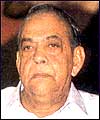Checking the political corruption and ensuring transparent way of
financing the democracy has long been part of public debate on electoral reforms in the country. In fact, the UPA govt introduced the State funding of Elections to the Lok Sabha and Legislative Assemblies Bill in December,2004, but it could not become law due to lack of political consensus.
India has remained a distant onlooker still debating the issue while innumerable corruption incidents marred the political landscape. The efforts put in so far to enact such a law has gone in vain. In 1972 ,the idea State Funding was first mooted by a Parliamentary Joint committee on amending the Electoral Law having A B Vajpayee and L K Advani as members.

In 1990, V P Singh government constituted a committee under the
then Law Minister Dinesh Goswami which reiterated the idea.In 1998, a committee of MPs chaired by CPI leader Indrajit Gupta and having members like Dr. Manmohan Singh and Somnath Chatterji endorsed it along with recommending for ensuring internal democracy in parties.
Assuming Rs 10 a voter, Gupta committee asked for creating a state fund with Rs 600 crore contribution each from the Centre and States.It however suggested that the state funding provided for political parties could be in kind and not in cash. Finding for resources , Gupta also recommended that a Cess could be imposed on the excess profits of the corporate, the second suggestion was to utilize the fifty per cent of funds alloted in MPLAD which roughly comes around Rs 1580 crore .
All the leading democracies such as the US, UK and Germany have enacted laws related to Public funding of the election. In US, a law was enacted way back in 1976 creating a provision of $ 84 million (Rs 400 crore) to both the Presidential candidates for the expenditure. Even a liberal and a non-interventionist democracy like UK where political financing remained largely unregulated has recently adopted a far more regulatory and legalistic approach to the issue.
Despite a pending Bill, the issue of state funding appears to be losing steam of late. Parties argued that provision under the state funding of the election was meant for recognized national and state parties only. But with mushrooming regional parties numbering over 800 parties, providing them funds would be uphill.
Besides, the cost of election has gone beyond imagination and meeting the huge resources could prove to be real problem. From a mere Rs 10 crore in the first General Election, only the administrative in successive years have gone up at exorbitant rates such as in 1998 – Rs 666 crore, In 1999 – Rs 880 crore and in 2004 1300 crore.
In the year 2009 the existing budgetary provision of Rs 850 crore would undoubtedly have to be revised . This expenditure excludes the huge spending by the candidates and the parties which according to a private research institute is expected to be around Rs 10,000 crore.
Undoubtedly, providing public funding to political parties may not be a panacea for a transparent and corruption-less democracy. Will state funding of elections, as proposed by the Gupta Committee, help clean up the Augean stables?



